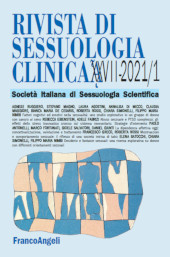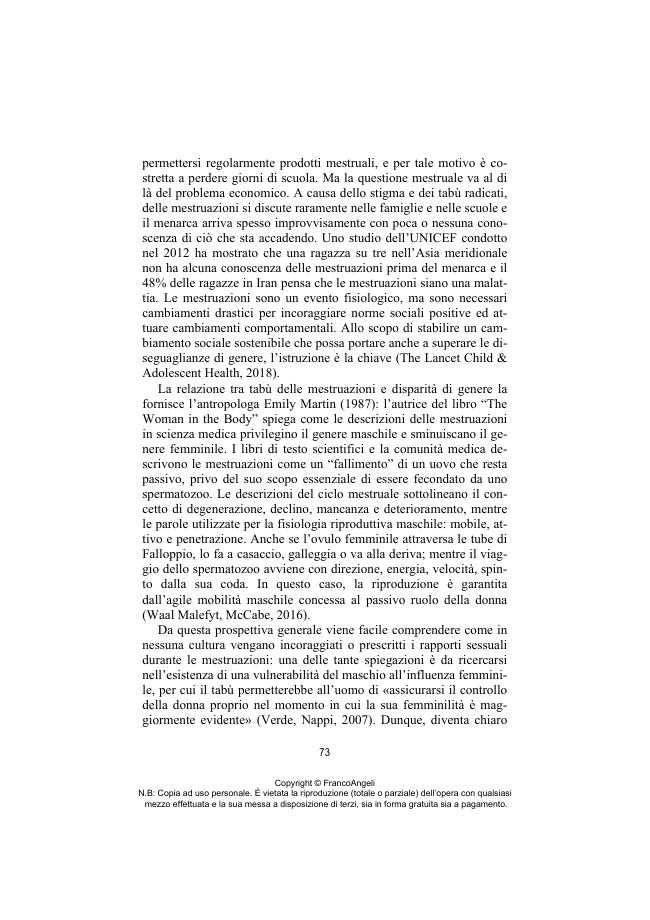Mestruazioni e comportamento sessuale : il riflesso di una società intrisa di tabù
67-79 p.
Tra i tabù esistenti sul ciclo mestruale, uno dei più radicati è quello del sesso durante le mestruazioni, il cosiddetto sesso mestruale. Il pregiudizio sul sesso mestruale ha un'origine biopsicosociale, di conseguenza solo un'analisi del fenomeno a 360° può aiutare a comprendere e combattere le origini di questo tabù. Inizialmente sono presi in considerazione gli aspetti psicologici della donna: come vive e concepisce le mestruazioni e di conseguenza se pratica il sesso mestruale. Successivamente si esaminano le modificazioni del profilo ormonale e quali caratteristiche fisiche si modificano nel corpo della donna durante il flusso mestruale, e come queste influenzano i rapporti sessuali in quei giorni. L'ultima parte offre una disamina di come differenti culture stigmatizzano il ciclo mestruale e il sesso mestruale e in definitiva ne ostacolano la pratica.
In realtà, sotto tutti i punti di vista, non ci sono controindicazioni al sesso mestruale, anzi si hanno benefici che aumentano il benessere psicofisico della donna e rafforzano il legame di coppia. Accanto alla visione predominante di "protezione" secondo la quale la donna deve celare le mestruazioni, sta comparendo e diventando più emergente l'idea del flusso mestruale come un qualcosa di "naturale" che come tale non implica dei cambiamenti nella routine della vita della donna. Dunque, se il sangue mestruale può essere mostrato senza vergogna e in quei giorni possono essere compiute tutte le consuete attività, diventerà semplice concepire anche il sesso mestruale come semplice e spontaneo. In una più ampia prospettiva si comprende che eliminare questo tabù, non solo serve a restituire naturalità al fenomeno delle mestruazioni, ma costituisce un passo importante verso la parità di genere.
In futuro, l'auspicio è che si sviluppi un dibattito più libero, che la ricerca scientifica e psicologica approfondisca questo ambito e che si possano pertanto superare tabù e diseguaglianze legate al solo essere donna. [Testo dell'editore].
Among the taboos that exist on menstruation, one of the most rooted is to have sex during menstruation, the socalled menstrual sex. The prejudice on menstrual sex has a biopsychosocial origin, consequently only a 360° analysis of the phenomenon can help to understand and remove the origins of this taboo. Initially the psychological aspects of the woman are considered: how she experiences and conceives menstruation and consequently if she practices menstrual sex. Subsequently, the modifications in the hormonal profile, which physical characteristics change in her body during the menstrual flow, and how these affect sexual intercourse during those days are examined. The last part offers a discussion of how different cultures stigmatize menstruation and menstrual sex and hinder their practice. There are no contraindications to menstrual sex, indeed there are benefits that increase the psychophysical wellbeing of the woman, and strengthen the couple's bond.
Alongside the predominant vision of "protection" according to which the woman must conceal menstruation, it is appearing and becoming more emerging the idea of menstrual flow as something more "natural" which as such does not imply changes in the routine of the woman's life. Therefore, if menstrual blood can be shown shamelessly and all the usual activities can be done in those days, it will also become easy to consider menstrual sex simple and spontaneous. From a broader perspective, it is understood that the elimination of this taboo not only serves to restore naturalness to the phenomenon of menstruation, but it also constitutes an important step towards gender equality. In the future, the hope is that a freer debate will develop, that scientific and psychological research will deepen this area and that taboos and inequalities linked to just being a woman can be overcome. [Publisher's text].
Fait partie de
Rivista di sessuologia clinica : 1, 2021-
Articles du même numéro (disponibles individuellement)
-
Informations
Code DOI : 10.3280/RSC2021-001004
ISSN: 1972-5183
DISCIPLINES
KEYWORDS
- mestruazioni, comportamento sessuale, sesso mestruale, tabù, protezione, naturale
- menstruation, sexual behaviour, menstrual sex, taboo, protection, natural



